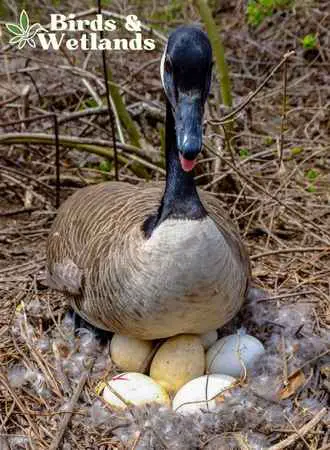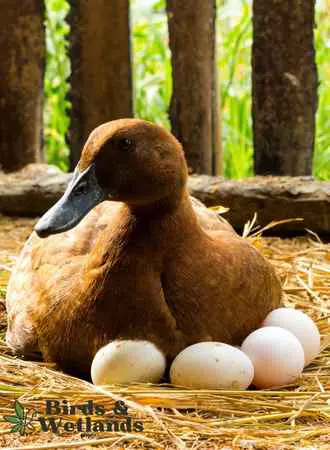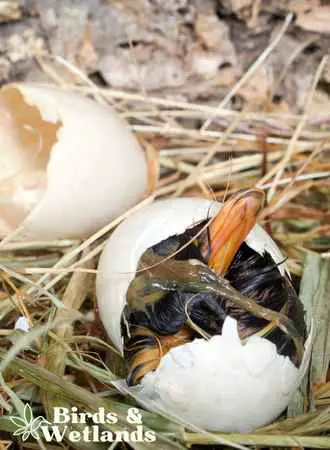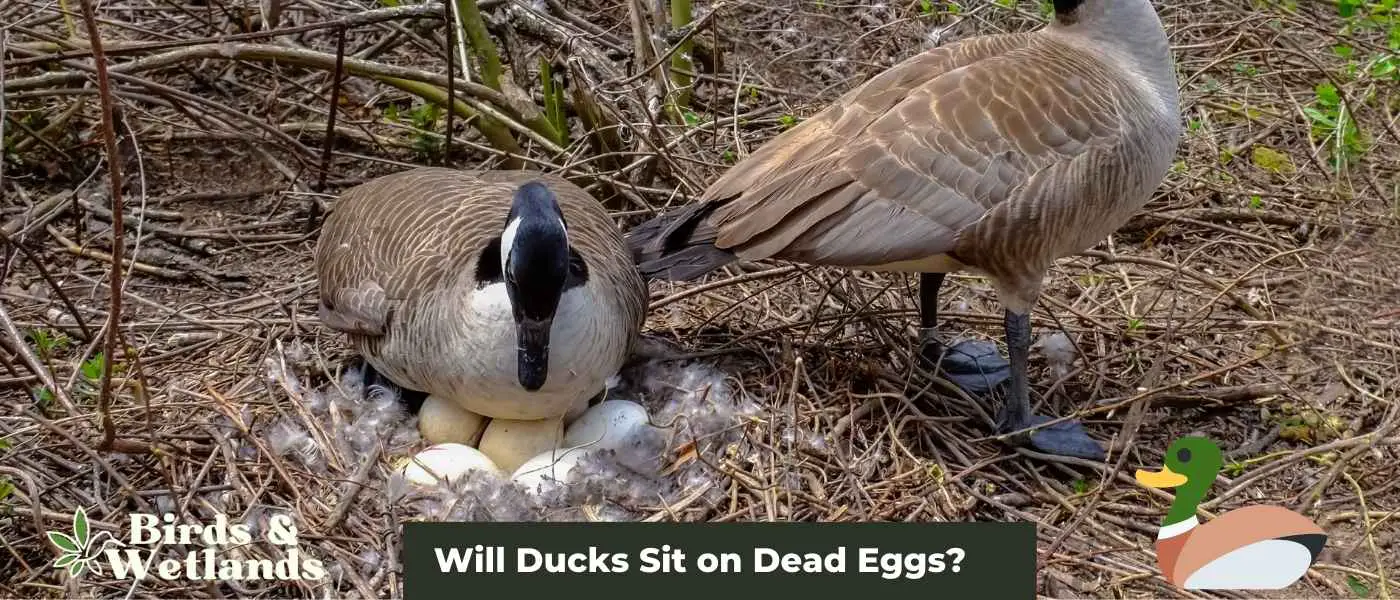Have you ever wondered about the maternal instincts of ducks? Specifically, will a mother duck continue to sit on her eggs even if they are no longer viable?
Yes, ducks can often continue to sit on their eggs, even if they are dead or infertile. This behavior is driven by their instinct to incubate their eggs until they hatch. However, it’s important to remove any dead or rotten eggs from a duck’s nest, as they can pose a health risk to the duck and any potential ducklings.
Key Takeaways on Will a Duck Sit on Dead Eggs
- Ducks will continue to sit on their eggs, even if they are dead, because they do not recognize them as dead. They believe the eggs are fertile and healthy.
- Fertilized duck eggs contain the genetic material of both male and female ducks. Unfertilized eggs contain only a portion of the female duck’s genetic material and will never produce chicks.
- The blastodisc, a tiny white spot in the yolk, is a representation of the female genetic material in fertilized eggs. In unfertilized eggs, it’s referred to as a ‘white spot’.
- Duck eggs may be infertile if no male duck (rooster) is present.
- The incubation period for duck eggs can range from 26 to 37 days, depending on the breed.
- Infertile eggs should ideally be no older than 10 days old to incubate successfully.
- Infertile eggs have a specific temperature range for incubation to ensure the best chances for successful hatching. For optimal hatchability, a temperature range of 99.5% to 99.7% relative humidity is ideal.
- The ‘Blood Ring’ stage is when the egg is no longer fertile.
- Ducks construct and insulate their own nests using their own feathers before they lay eggs.
- The final group of eggs that a single duck deposits during a particular nesting/incubation season is a clutch of eggs.
- The incubation period begins when the internal temperature of the egg reaches 99.5°F, which occurs only after the duck has been sitting continuously on her clutch of eggs for an extended period.
- Ducks spend 20-23 hours each day sitting on their nest during the incubation period.
- Ducks may eat their own eggs or the eggs of other ducks when they are starving or deficient in certain minerals, such as calcium.
- Hatching takes between 26 and 37 days after laying the eggs, depending on the breed of the duck.
Will a Female Duck Sit on Dead Duck Eggs?

When a duck sits on all the eggs, she really cannot tell whether they are dead or not. She will continue to incubate her eggs for weeks, only to discover that there is no living duckling inside.
In some cases, even if the egg shell is cracked or damaged, the duck will continue to sit on them, believing they are still viable.
Moreover, the lack of development within an egg may go unnoticed by a female duck who is accustomed to sitting on a large clutch of undeveloped eggs for extended periods.
It is important to remember that the duck believes all her eggs are viable and will eventually hatch given enough time. So while this may seem like self-sacrifice at first glance, from the mother duck’s perspective, she is simply trying to do what comes naturally.
Different stages of egg development
| Stage | Description |
|---|---|
| Fertilized Egg | Contains genetic material from both male and female ducks. Has a blastodisc, a tiny white spot in the yolk. |
| Unfertilized Egg | Contains only a portion of the female duck’s genetic material. Has a ‘white spot’ instead of a blastodisc. |
| Incubation | Begins when the egg’s internal temperature reaches 99.5°F. The duck will continuously sit on the eggs during this stage. |
| ‘Blood Ring’ Stage | The egg is no longer fertile at this stage. |
| Hatching | Takes between 26 and 37 days after laying the eggs, depending on the breed of the duck. The ducklings will begin to move and pound against the shell. |
Do Ducks Eat Their Eggs?
Most ducks that are well-fed, healthy, and live in suitable conditions will not eat duck eggs. If a duck is malnourished or lacks certain vitamins and minerals, it may eat its eggs to get these nutrients. If a duck stumbles upon a cracked duck egg, it will eat it, especially if it is hungry.
If a female duck is starving or unable to find food, she may become aggressive toward her eggs or the eggs of other ducks and either break or eat them.
While broad generalizations about whether ducks deliberately eat duck’s eggs are impossible to make, there are numerous factors to consider when attempting to comprehend this behavior.
Woodlink Cedar Duck Nesting Box
Attract ducks to your wetland area and provide them with a cozy, secure nesting space using the expertly crafted Woodlink Cedar Duck House, made with high-quality materials in the USA.

Pros
- Ornithologically designed: This nesting box is specifically created for ducks, ensuring an optimal environment for them to thrive.
- High-quality materials: Made from re-forested, kiln-dried, inland red cedar, the Woodlink Cedar Duck House is both durable and eco-friendly.
- Easy to install: The nesting box comes fully assembled, with screws included for quick and easy mounting.
- Made in the USA: Take pride in knowing that you are supporting a product that is made domestically, ensuring top-notch quality and craftsmanship.
- Versatile use: While designed specifically for ducks, this nesting box can also be occupied by other species like screech owls, squirrels, and pileated woodpeckers.
Cons
- Mounting height: Users must research and choose the appropriate mounting height (usually 4-6 feet above the ground) and install a baffle on the post to deter predators like raccoons and cats.
- Limited viewing access: Although the front of the box can be opened for viewing, it is important not to disturb nesting birds, which may limit opportunities for observation.
Duck Maternal Behavior: A Complex Instinct
Ducks are known for their powerful maternal instincts, often continuing to incubate their eggs even if they are dead or infertile. This behavior stems from an innate drive to protect and nurture their offspring until they hatch.
However, it’s important to note that dead or rotten eggs should be removed from a duck’s nest as soon as possible, as they can pose health risks to the mother and any potential ducklings.
Key points to remember:
- Ducks will continue to sit on their eggs, even if they are dead, because they do not recognize them as such. Their instinct tells them the eggs are fertile and healthy.
- Fertilized duck eggs contain the genetic material of both the male and female ducks, while unfertilized eggs only contain a portion of the female duck’s genetic material.
- The incubation period for duck eggs varies depending on the breed, ranging from 26 to 37 days.
- Ducks construct and insulate their own nests using their feathers, preparing a cozy and safe place for their eggs.
FAQs on Hatching Duck Eggs
Where Do Ducks Like to Lay Eggs?

Wild ducks are well known for their affinity for water and spend a lot of time wading and swimming in ponds, lakes, and rivers. These waterfowl are also not picky about where they lay their eggs; it is common for these hardy birds to choose the most convenient location and prefer to lay their own eggs on dry land.
Female ducks typically build their own nests in quiet, secluded areas, such as shaded brush piles or hollow logs. These locations are ideal because they protect from disturbances such as frequent foot traffic or loud noises and physical barriers that help protect eggs from predation and inclement weather.
Many duck species lay their eggs in a circle outside an existing depression or hole, lining it with her down and extra soft feathers. Nesting in these locations helps improve the structure’s natural insulation.
How Many Eggs Does a Duck Lay Before She Sits on Them?
A typical duck will lay around 12 eggs before sitting down to incubate its eggs. A healthy duck with access to food sources will lay more eggs than a skinnier duck.
Ducks typically lay one egg per one or two days, but they can occasionally lay a clutch of several eggs all at once. The ducks will stop laying eggs once the final group of eggs have been laid and they have settled down and begun sitting on a clutch of eggs. They will pull their own feathers from their smooth belly to aid with incubation after the laying period and when they have started sitting on their eggs to regulate internal temperature.
Incubation periods for some ducks including Pekin ducks take 28 days but for other eggs from other breeds may take longer.
Will Ducks Sit On Unfertilized Eggs?
Wild and backyard ducks are known for having strong maternal instincts and frequently sit on infertile or fertilized eggs to keep them warm and safe. There is no way for ducks to tell if their eggs are fertile or not.
However, they cannot always recognize whether or not an egg has been fertilized. As a result, ducks may sit on fertilized and infertile eggs.
The duck may even sit on infertile eggs in her nest longer than the average incubation days, hoping that the clutch of eggs will produce ducklings. While this can be disappointing if the eggs do not hatch, it usually has no negative consequences on the duck. When the duck notices that the eggs are not developing properly, it will usually abandon them.
How Do You Tell if a Duck Egg Is Alive or Dead?

There are a few key indicators to determine whether the eggs inside are alive or dead.
An intact, unmarked shell is typically a sign of life. If you shine a bright flashlight through the egg in a dark room and examine it closely, you might notice the embryo inside along with small veins running through it.
If you gently shake the egg and listen carefully, you may hear faint tapping or movement from inside if it is still alive.
How Long Can Duck Eggs Go Without Being Sat On?
Duck eggs are extremely delicate and require special care and attention to remain healthy. Mother ducks typically sit on their eggs until they begin to incubate. Once this occurs, they must continue to sit on the eggs until they hatch.
The eggs are endangered if the egg-laying duck cannot be present with her eggs at all times, either before or after sitting begins.
A hen duck cannot be separated from her eggs for up to an hour without endangering its survival.
On rare occasions when she did not begin sitting and leaves her nest, some of the eggs can remain viable for up to two weeks. These eggs should be viable and hatch after the whole process of incubation if the nest is not disturbed and kept warm until returning mothers are ready to sit on them again.
Do Male Ducks Sit on Eggs?
Male ducks are not commonly associated with sitting on fertile eggs. In fact, they do not sit on eggs at all. The hen is responsible for incubating the eggs and caring for the hatchlings. A male duck, or drake, will usually stand guard over or beside the nest to protect his mate and eggs from predators. Only the hen actively participates in incubation and raising young ducks. After the eggs hatch, the drake often leaves his mate to join other males.


